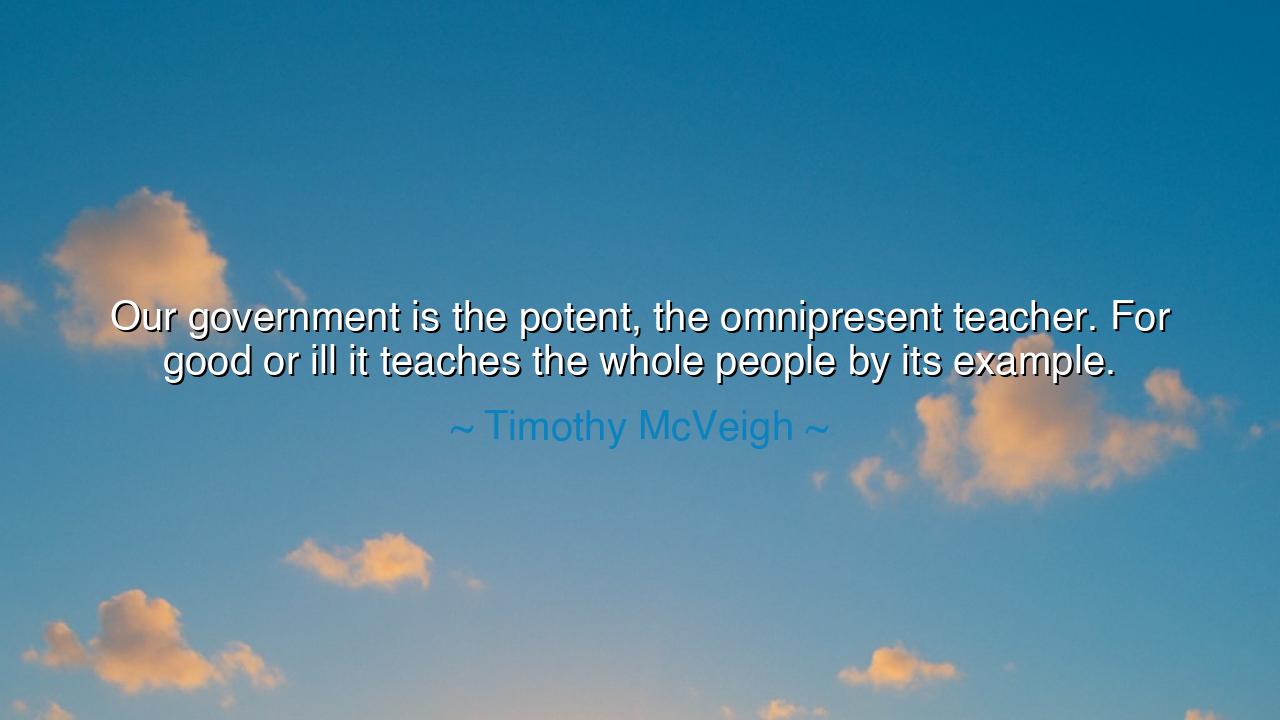
Our government is the potent, the omnipresent teacher. For good
Our government is the potent, the omnipresent teacher. For good or ill it teaches the whole people by its example.






The words of Timothy McVeigh—“Our government is the potent, the omnipresent teacher. For good or ill it teaches the whole people by its example”—speak with the grave weight of responsibility, warning that authority instructs not only through law and policy, but through action, precedent, and example. Here, the government is portrayed as a teacher whose lessons are unavoidable, shaping the moral and civic character of the populace. Every decree, every act, and every failure or triumph becomes a form of instruction, teaching citizens what is permissible, what is valued, and what is to be feared or emulated.
The meaning of this reflection is that governance is inherently educational, whether consciously intended or not. Citizens absorb the behavior of their rulers: their virtues inspire respect, their vices breed cynicism or imitation. A government that embodies justice, fairness, and transparency teaches trust and ethical conduct. Conversely, a government that engages in corruption, abuse, or deception normalizes those behaviors, demonstrating that power can corrupt not only those who wield it, but the very fabric of society itself. McVeigh’s words highlight the immense moral influence of the state, reminding us that leadership carries the responsibility to educate wisely.
History offers abundant examples of this principle. The Roman Empire, through both exemplary leaders and tyrants, shaped the behavior and expectations of its citizens. Augustus, through prudent legislation and personal discipline, fostered an era of relative stability and civic pride. In contrast, emperors such as Caligula and Nero, whose actions were arbitrary and cruel, taught lessons of fear, indulgence, and moral decay. The people learned not only the law but the culture of authority itself. Governance, therefore, functions as an omnipresent teacher, instilling values through example as much as through edict.
Even in modern history, the principle holds true. Franklin D. Roosevelt, through his leadership during the Great Depression, demonstrated perseverance, empathy, and decisive action. His government’s initiatives, from the New Deal to public communications, instructed citizens in the values of civic engagement, shared responsibility, and resilience. These lessons were learned not solely through policy, but through the example of leadership itself. By contrast, governments that act oppressively or arbitrarily often teach passivity, distrust, and cynicism, illustrating the double-edged nature of McVeigh’s observation.
The lesson for us, O seekers of wisdom, is that authority shapes society profoundly, beyond formal laws and regulations. Citizens absorb not only the words of leaders but their deeds, their consistency, and their moral posture. To demand justice, integrity, and ethical behavior from government is to insist upon the quality of the education that shapes the people. Likewise, those who hold power must recognize that their actions instruct far more than speeches or policies alone—they form the character of nations.
Practically, this means engaging with government critically, observing not only what is legislated, but what is modeled. Support institutions and leaders who demonstrate ethical conduct, and resist those whose example undermines the social good. Likewise, those in positions of authority—whether local, national, or organizational—must act with integrity, knowing that their behavior is a lesson imparted to all who watch, consciously or unconsciously. The responsibility to teach through example is inseparable from the power to govern.
Thus let it be inscribed upon the scrolls of memory: government is the omnipresent teacher, instructing through every act, decision, and precedent. Timothy McVeigh’s reflection, though dark in its source, carries the timeless truth that power educates, whether wisely or poorly. Citizens and rulers alike must heed this lesson: the moral tone of leadership reverberates through society, shaping the character, beliefs, and actions of generations. To govern is to teach; to rule is to instruct; to act is to set an example whose echoes endure long after the act itself.






AAdministratorAdministrator
Welcome, honored guests. Please leave a comment, we will respond soon